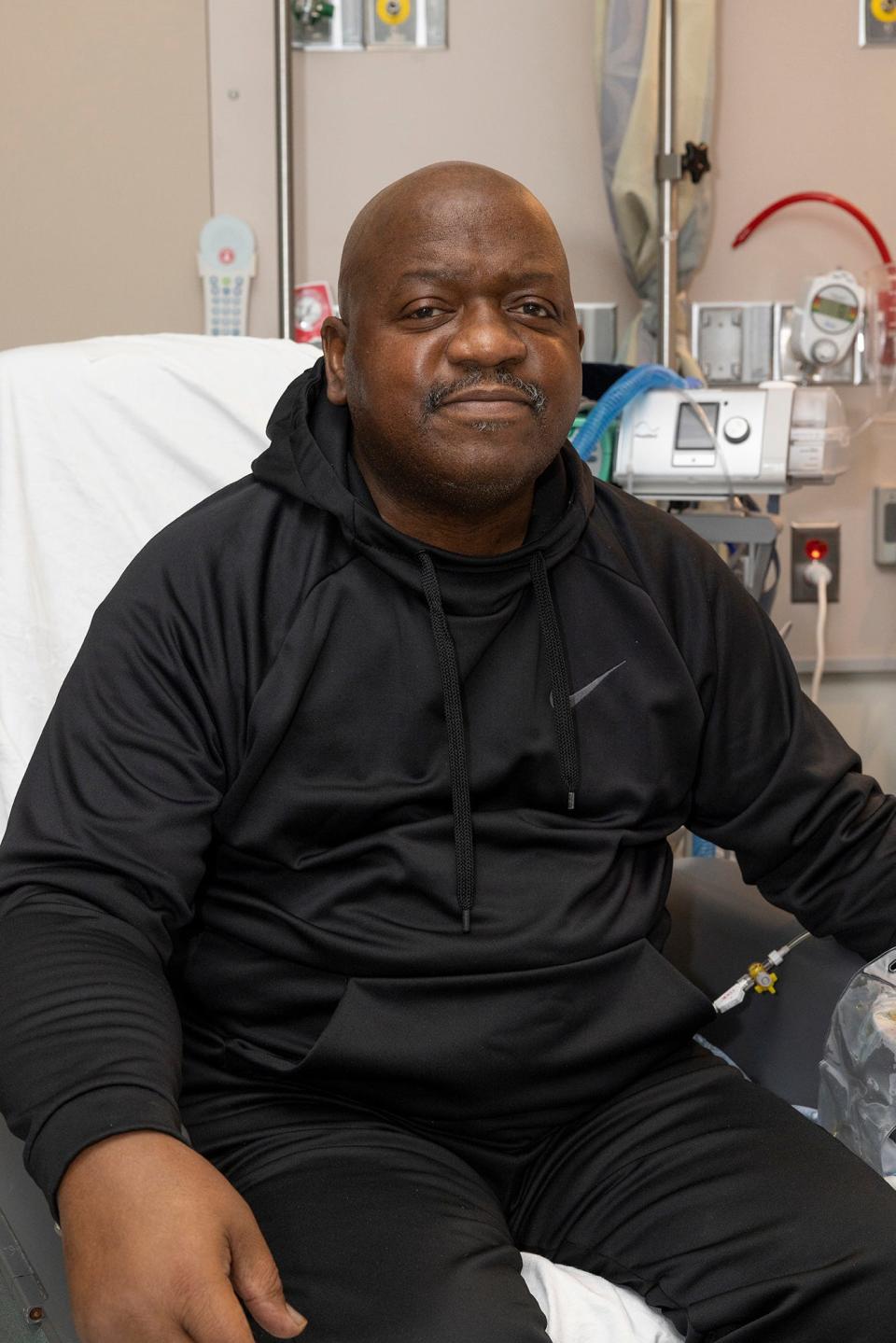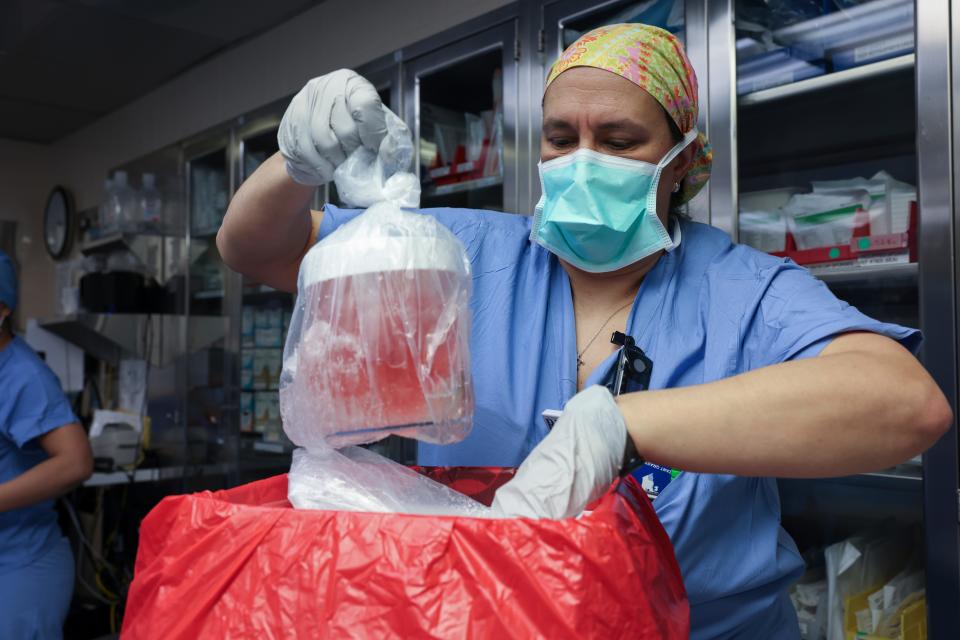First-ever kidney transplant from gene-edited pig offers hope for thousands
BOSTON ? Massachusetts General Hospital announced it has successfully transplanted a genetically modified pig kidney into a person, the first time someone has survived with that organ from another species.
Richard "Rick" Slayman of Weymouth, Massachusetts, is recovering well from four-hour surgery March 16 and was released from the hospital on April 3.
Slayman, a systems manager for the Massachusetts Department of Transportation, agreed to the procedure, according to his doctors and a personal statement released by the hospital, because his medical options were so limited and as "a way to provide hope for the thousands of people who need a transplant to survive."
More than 100,000 people are on the national organ transplant list, though less than half that many transplants are done each year. Even more in need of an organ never make it to the list at all because they are not good candidates for a transplant or they die first.

That's why researchers have been working for decades to find a way to use pig organs as replacements for human ones.
But certain sugars that sit on the outside of every pig cell immediately alert the human immune system that the pig part doesn't belong. In very early attempts at cross-species transplants in the middle of the past century, the organs turned black almost immediately as the person's immune system rejected them.
In Slayman's case, however, the pig kidney immediately turned pink when surgeon Tatsuo Kawai connected the human and porcine blood vessels and ureter. It rapidly produced urine.
"It was truly the most beautiful urine I have ever seen," Kawai said Wednesday to a roomful of reporters and Massachusetts General staff, who burst into applause.
Why use pig organs?
Pig organs make sense for transplant because they are roughly the right size for people, are relatively similar biologically, and are already bred by the billions for food, so sacrificing them for their organs raises fewer ethical concerns than using primates would.
Rejection is still a major concern ? both with the pig organs and with any organ transplanted from one being into another.

Dr. Joren Madsen, director of the MGH Transplant Center, said researchers at the hospital had been able to overcome the "formidable" barriers to transplantation with three major advances: by genetically modifying the pigs to make them more compatible with people, by improving the drug regimen to reduce the risk of rejection, and by providing enough evidence through animal-to-animal transplants to make researchers and patients feel comfortable testing in people.
Massachusetts General was the site of the first human-to-human organ transplant, in 1954, when an identical twin donated his kidney to his brother. Dr. Paul Russell, who launched the hospital's transplant program in 1963 and lent his name to the museum where Wednesday's news conference was held, sat in the front row, at age 99, hearing about an advance "once deemed unimaginable," as Madsen put it.
The pig, which donated its life and its kidney to Slayman, was raised on a farm in an undisclosed Midwestern location and flown to Boston for the procedure, said Mike Curtis, CEO of eGenesis, the biotech company that breeds and raises gene-edited pigs for transplant.
Though some pigs in other transplant experiments have anywhere from three to 10 gene edits, the cloned pig used in Slayman's transplant had 69 edits, Curtis said.
Three genes were eliminated or "knocked out" to reduce the risk of immediate rejection after the transplant. Seven more human genes were added to reduce the likelihood of later rejection, and 59 genes related to porcine endogenous retroviruses were inactivated to eliminate the chance that the viruses could jump from pig to person.
A monkey with a kidney from a pig with the same gene edits was kept alive for two years.
Why was the transplant needed?
Slayman has had type 2 diabetes for 30 years and was on dialysis for seven years before receiving his first kidney transplant from a deceased donor in 2018, said his nephrologist, Dr. Winfred Williams.
Even before the transplant, his veins were making dialysis difficult, Williams said, because they kept clotting, blocking blood flow.
After five years, the new organ began failing. It was removed and he was placed back on dialysis.
He had 30 to 40 surgical and radiological procedures to keep his veins open, but dialysis still wasn't working well. "I witnessed my patient becoming despondent and depressed," Williams said. "At one point he told me … 'I just can't go on.' I began to think about extraordinary measures."
That's when he began to consider Slayman a candidate for the pig transplant surgery.
Because Slayman is the first, it's not clear how long the kidney will continue to work well. "We're aiming for more than two years, but we still have to be careful," Kawai said.
Two patients have received gene-edited pig hearts at the University of Maryland Medical Center. One survived for about two months in 2022; the other for nearly six weeks in 2023.
Williams said Slayman was in much better physical shape than both heart patients before surgery, so he expects a much better outcome.
What does the future hold?
Dialysis, which is done three times a week, three hours each, was never intended to become a lifelong solution, but it has now become a "last resort" for 600,000 Americans, said Dr. Leonardo Riella, medical director for kidney transplantation at Massachusetts General.
"Picture a different narrative, where healthy young kidneys are available for transplantation," Reilla said. "Today we are offering a glimmer of hope for many of these patients."
Older patients typically struggle with dialysis, so the pig kidneys could particularly offer opportunities for them, the doctors said. Fewer than a quarter survive the five years that most have to wait on the transplant list.
It's not clear how much pig transplants will cost. Because it was experimental, the new procedure's cost was "enormous," Williams said. Typically, transplants are cheaper than dialysis. "Once it becomes second-nature, that cost structure will be diminished."
Researchers will need to test pig kidneys and other organs in many more patients at multiple facilities before the Food and Drug Administration would consider approving them for routine use.
Mass General issued a statement from Slayman when he was released from the hospital with a clean bill of health.
He described the day as "one of the happiest moments of my life."
"Today marks a new beginning not just for me," he said, but for "anyone who has seen my story and sent well-wishes, especially patients waiting for a kidney transplant."
Karen Weintraub can be reached at [email protected]
This article originally appeared on USA TODAY: First successful kidney transplant from gene-edited pig offers hope
